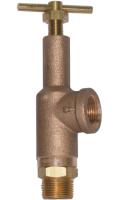Proper Valving Can Prevent Spills and Other Issues
Posted by Andrew Greess on May 15, 2015
The proper use of shut off valves, usually ball or gate valves, helps reduce the risk and severity of chemical spills. Unfortunately, because of the increased cost, valves aren’t always installed where they should be. The incremental cost of a properly placed valve is minimal compared to the long-term benefit of smaller chemical spills and reduced repair expenses.
Below are examples of poor or non-existing valve usage.
The first is a tank penetration at the bottom, with no shut off valve, only a cheap plastic elbow fitting, which is exposed to harsh chemicals, hard use and extreme weather. If or when the fitting cracks, there’s no way to shut off the flow of water. The entire tank contents will spill.

The next is a gate valve that can shut off when there’s a problem. Another benefit of good valving is the ability to shut off water flow to a key component to allow servicing without having to wait for the tank to be empty. In this case, by closing the gate valve, the filter can be checked even when the tank is full. Smart valve design will reduce downtime and repair expenses.
The third example is the plumbing under a 200-gallon spray trailer. The manufacturer used a low-cost PVC ball valve under the trailer. There are a couple of problems with the design. First, this is no place for a cheap plastic valve. If a rock kicked up off the street cracks the valve, then there’s no way to stop the spill. There’s too much cheap plastic between the valve and the tank creating more parts to break and more places for the sprayer to leak. A crack in any fitting between the tank and the valve can’t be shut off. Don’t use cheap fittings in key places (or anywhere for that matter) and place shut off valves as close to the water source as possible to reduce spill risk.
How a valve can be used to help prevent spills? There’s a ball valve in front of the spray gun. All spray guns have rubber O-rings that will leak eventually. The strategic placement of a shut-off valve can help reduce the impact of this type of leak.
In all of these examples, the cost of the valve is minimal when compared to the total cost of the sprayer and the cost of downtime and chemical spills that can be prevented. Suggestions:
- Inspect power sprayers for proper valving. Are valves in key places to prevent or reduce spills?
- Will the valves allow access to critical components, such as the pump and filter, even when the tank is full?
- Are valves made from high-quality materials, or were cheaper valves used to save money?
When purchasing new power sprayers, know what you’re getting. Ask questions of your vendor to understand what valves are included with the sprayer. Ask about valve quality, location and purpose.
Spray technicians use equipment every day. Ask them where they would like to see shut-off valves.
A few minutes spent on examining your equipment to prepare for and anticipate problems will save you time and money.
Qspray is a professional pest control and landscape equipment business you can trust. We offer decades of experience, industry expertise and we stock all the hard-to-find parts for your spray equipment. Learn more about Qspray today.

